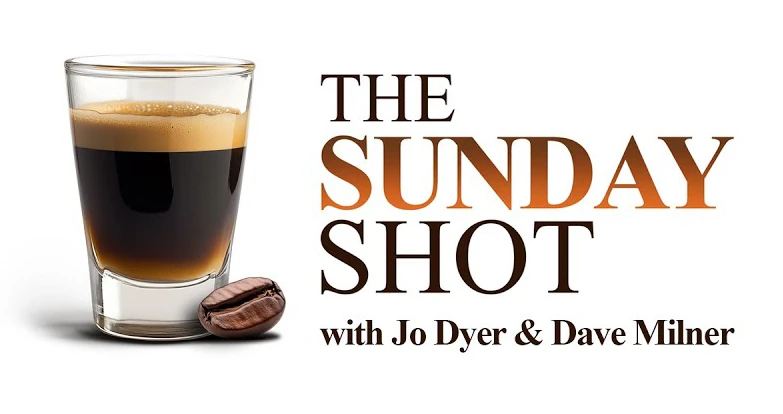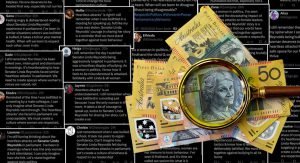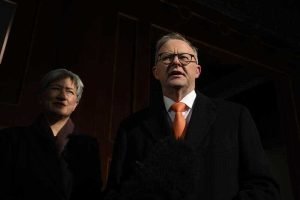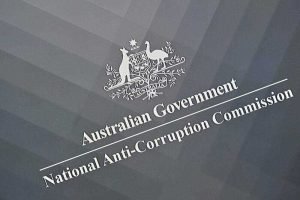The Shot
The ‘No’ campaign’s argument isn’t based on fear – it IS fear
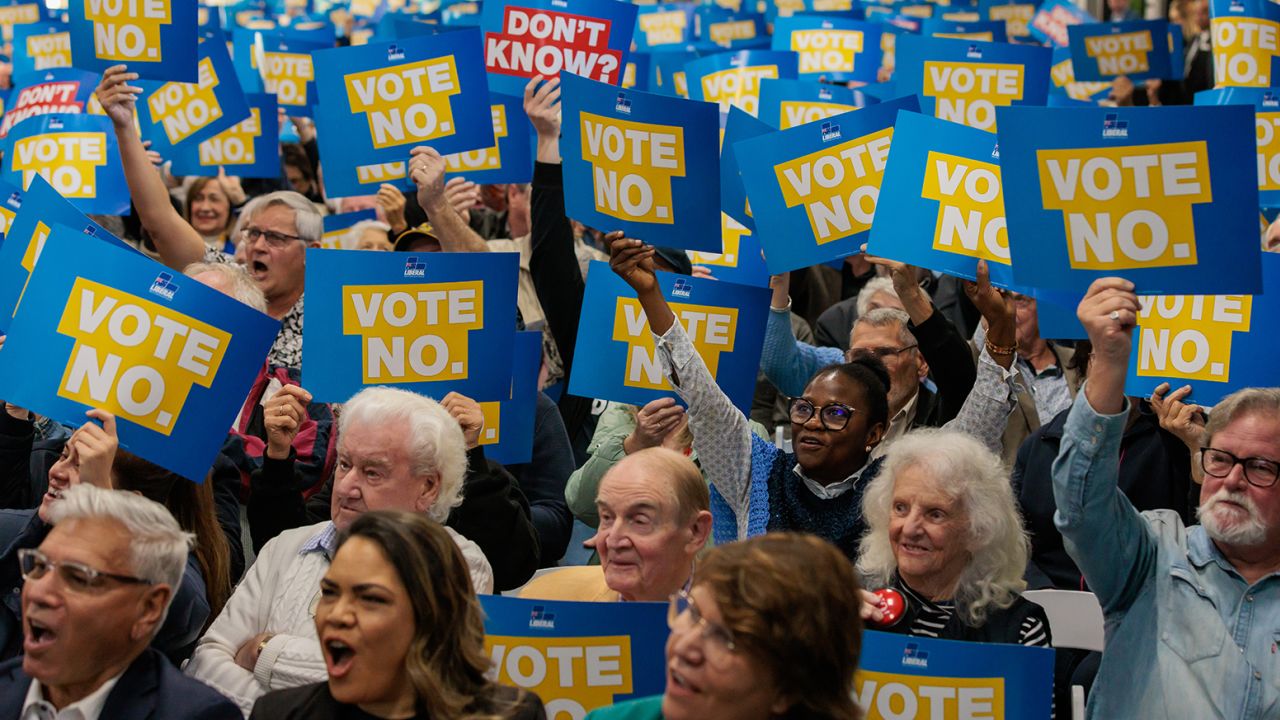
Preambles being all the rage, before we begin I’d like to acknowledge how painfully Australian it is that the Prime Minister announced the date of the referendum – ostensibly about whether we should listen to Indigenous people – almost immediately after photo-oping in a personalised Rio Tinto shirt, a mining company that was recently urged not to blow up a 46,000-year-old Indigenous heritage site but did so anyway because this is Australia and we don’t listen to Indigenous people.
Whether the PM was trying to provide an ironic, embroidered example of why the Voice might be necessary, or if his attire was simply a run-of-the-mill swearing of allegiance to a corporate sponsor, we’ll never know for sure. But keep on fighting those Tories, Albo.
¯\_(ツ)_/¯
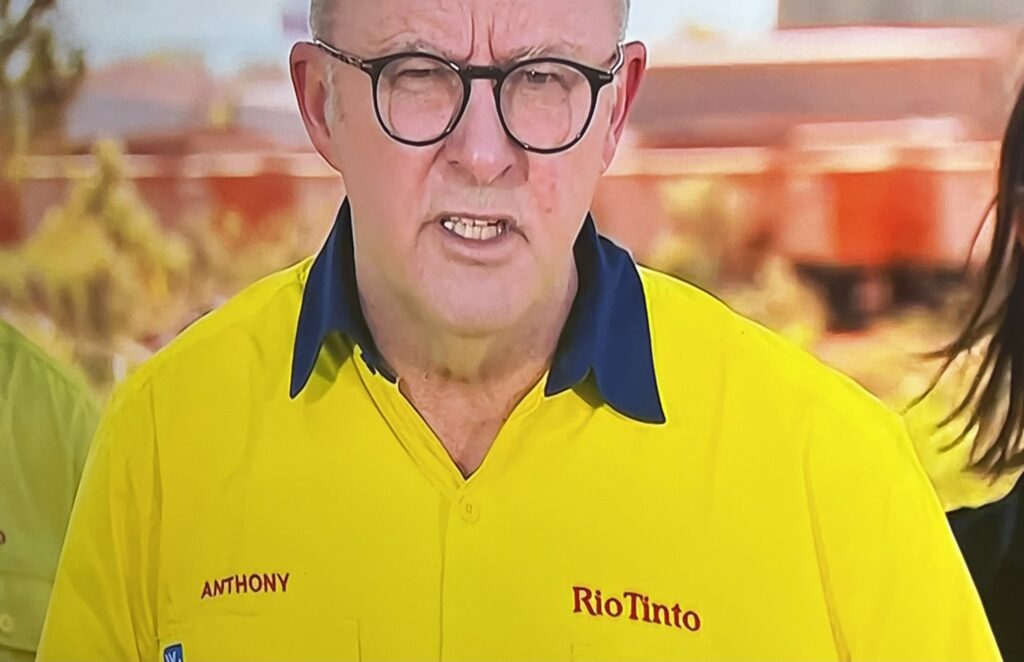
Anyways.
***
Across the vast expanse of human history, whenever a systemic injustice is set to be addressed, a garbled chorus of conservatives incoherently shit themselves, terrified that things are about to become less awful for someone else. This is a well worn and readily exploitable pattern.
Gay marriage was set to Domino Effect us into marrying sheep and tractors, Australia’s moral compass ablaze in a barnyard orgy of inappropriate but innovative uses of farmyard implements. Needless to say, this did not happen. The apology to the Stolen Generations was going to lead Australia down an endless path of compensation lawsuits, bankrupting the nation as wealth funnelled its way into remote communities bursting with gold chains, teeth grills and Cadillacs bouncing on hydraulic suspension. This didn’t happen either. Mabo and the Land Rights movement was going to lead to white Australians losing their homes. I’m sure you’ll be shocked, but this hasn’t come to pass. And allowing women to vote was going to destroy the wisdom believed inherent in democratic decision making. Democracy is a little on the fritz, admittedly, but even Andrew Tate couldn’t blame that exclusively on women. Didn’t happen.
The rigorously adhered to political ideology of this particular type of person is that they are scared. Their character arc, eternally and repeatedly, is that they go from being scared to being wrong. Once society has forgotten what all the fuss was about because the sky didn’t fall, they move onto the next advancement in civil rights or human progress and find creative new ways to find that terrifying, too. This psychological tendency is quite explicitly the target of the No campaign, the conversation disingenuously muddied for cynical political purposes by a Liberal Party machine devoid of any substance beyond self-interest.
‘It’s really simple,’ said Indigenous activist Thomas Mayo on The Shot’s podcast last week. ‘We are just saying Yes or No to recognising Indigenous people in our Constitution – a Constitution that has explicitly excluded Indigenous people for a very long time. And to do it in a practical way, an Australian way, which gives them a hand up and says, ‘We’ve been making decisions about Indigenous people for a long time, now we’re going to set up an expectation that we should listen to you first.’ It’s that simple.’
This is far less confusing a notion than Peter Dutton wants you to believe. The Voice is an advisory body on Indigenous matters only. It would join a lengthy list of outside influences with direct lines to the soiled halls of power in Canberra: the Business Council, the IPA, PwC, the unions, the fossil fuel industry, Rupert Fucking Murdoch, Peter Fucking Costello, Rio Fucking Tinto, etc. Indigenous people will select who represents them on The Voice. “We work out amongst ourselves who speaks for us, not someone that a political party chooses,” says Mayo. The government, chosen by the will of the broader population, can then heed the advice of the Voice or ignore it. And this arrangement will be enshrined in the Constitution to stop future governments tearing it up, as has happened before (because not listening to Indigenous people is a favourite pastime of racist governments past, present and emerging).
That’s it. This is not scary stuff.
‘It is a modest proposal,’ says Mayo. ‘Given all of the injustices, all of the marginalisation of Indigenous people, the massive gaps in education and health and employment, life expectancy of eight years less – we’re not calling for a special right here, we’re asking for an enhancement to our democracy so that Indigenous people can just have a say.’
If this were an article in a mainstream news outlet, this is the paragraph where I would attempt to provide faux balance with a compelling, conflicting viewpoint. I shan’t be doing that because a staggering proportion of the No campaign’s arguments aren’t even arguments, they’re disingenuous hypotheticals dripping in privilege and fear. They aren’t even positions based on fear – they are fear itself and little more.
Take their slogan, ‘If you don’t know, vote No’. A celebration, a championing of lazy, willful ignorance. You could find out more, but why would you bother, here’s some franking credits. At its core, this six-word brain worm isn’t all that far removed from, ‘The boogeyman might be under the bed, I’m not gonna check but vote to leave the nightlight on’.
Consider also the various interchangeable bits of excrement that flood your mentions if you express support for The Voice online.
- ‘It makes our Constitution race based!’ or ‘this is like apartheid!’ scream a sea of verified Twitter Blue subscribers without profile pictures.
Sorry, but the amendment doesn’t do anything of the sort, it simply acknowledges the truth of what’s been going on here for 60,000 years, like other settler nations – the USA, Canada and New Zealand – have done before us. Also, the Constitution already mentions race (Part III, Section 25) in a deeply probo section about how it’s legal to exclude people from voting based on race. You should probably advocate to have that bit removed if you don’t want a ‘race based’ Constitution!
- ‘It will add a third chamber of Parliament and The Uluru Statement has secret clauses in 20-something hidden pages that will cede control of the land to Aboriginal people’.
It is a single page, here, and Peta Credlin thinks you’re a pliable, convenient cog who knows that when you say ‘do your own research’ you really mean ‘watch Sky News’. There are also more entertaining conspiracy theories out there for you to consider, like the Flat Earth movement, or the one about Justin Trudeau being Fidel Castro’s secret lovechild, so why not get on that train instead!?
- ‘There are no details on how The Voice will work!’
Yes there are.
- ‘But those details won’t be mentioned in the Constitution!’
We vote on broad principle all the fucking time! Literally in every single election. And the Constitution is a fairly broad-strokes document. It provides principles and core rules that are then expanded upon in legislation passed through Parliament. The Constitution doesn’t describe how the tax office or the military or the fucking postal service is structured either, but that isn’t a problem, and neither is this. Peter Dutton knows this, and you should too.
***
The difficulty with dissecting all these No arguments seriously is that there’s basically nothing there except fear of things that won’t happen. This is the result of the least interested people in the world being cynically prodded to ask for ‘more details’. The No campaign is so full of shit it needs an enema.
‘They’re completely disingenuous,’ says Mayo. ‘They understand what they are doing. They are seeking to confuse and to scare Australians. Older Australians might remember this tactic; in the 1960s, when Indigenous people were going to get equal wages, they said that cattle stations and other businesses would shut down – that they couldn’t afford to run without Indigenous labour just being paid a bit of flour and tobacco.’ Add it to list of things that didn’t happen!
And so here we are again, standing at the crossroads of hope and fear. On October 14, Australia will head to the polls to vote on the Indigenous Voice to Parliament, as proposed in the Uluru Statement from the Heart. One side has outlined practical ways the Voice will help close Australia’s shameful statistical gaps; the other is jumping at shadows and clinging to a whitewashed past. If you take anything at all from this, remember that if a situation is more complex than running away from a sabre-tooth tiger or punching a shark on the nose, fear is a terrible basis for making decisions. It colours evidence and exaggerates danger in the unknown, leading to irrational and illogical choices. When we are fearful we fight or we flee, and the No campaign is fighting to flee from reality.

